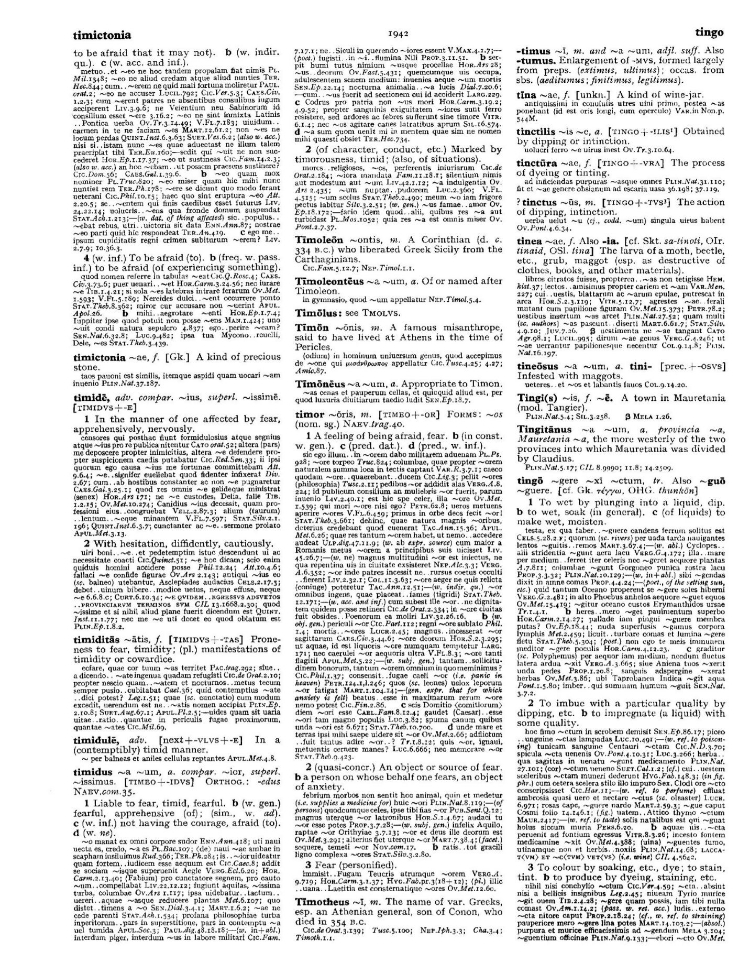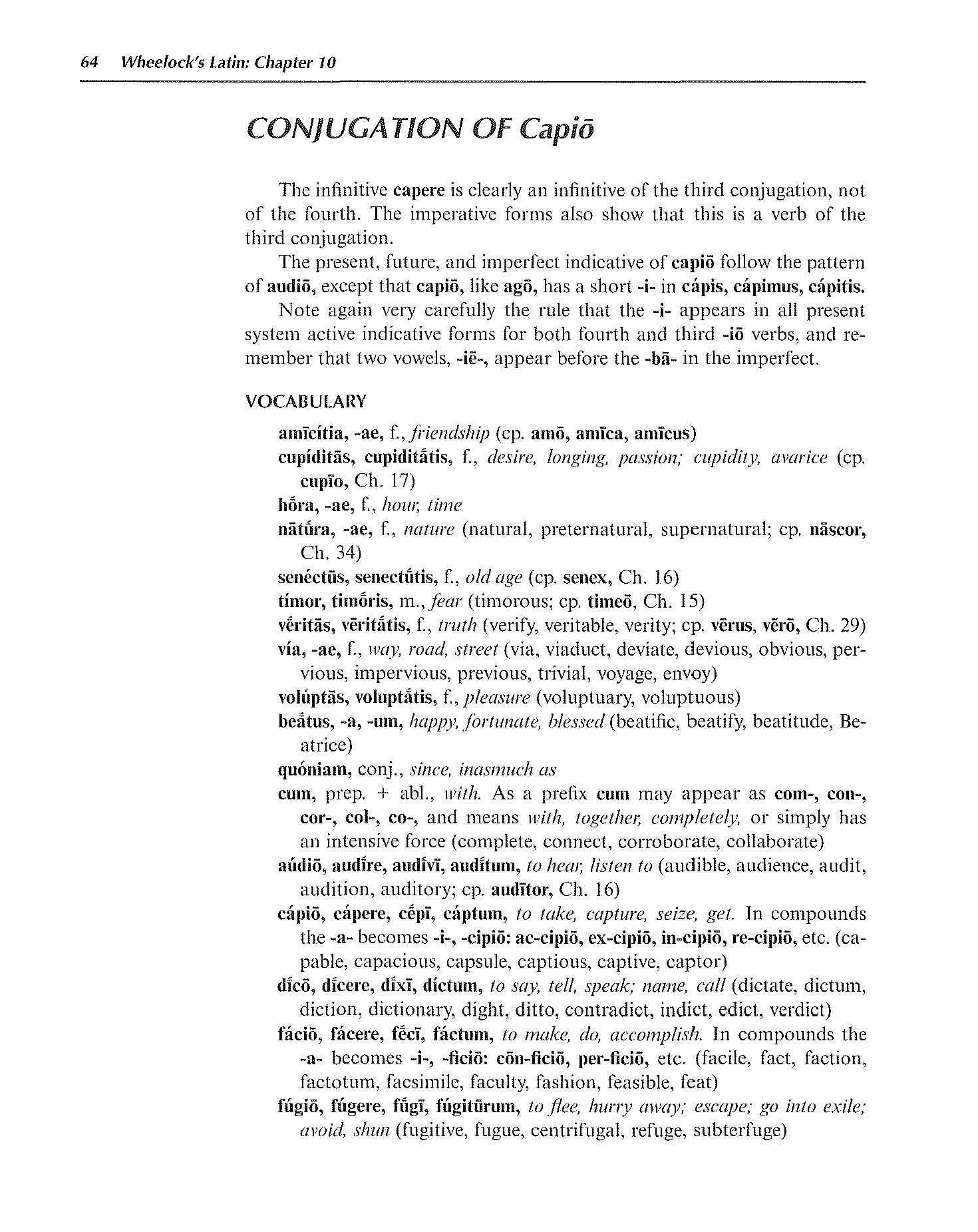
page_listing.tpl
page_subListingDetails.tpl
sub_listingDetails_style1.tpl
sub_listingDetails.title.tpl
timor fear
timor is a Latin Noun that primarily means fear.
Definitions for timor
Wheelock's Latin
Noun
- 1
fear
English derivatives:
timorous
Oxford Latin Dictionary
Noun
- 1
A feeling of being afraid, fear. (b) (in const. w. gen.). (c) (pred. dat.). (d) (pred., w. inf.).
- 2
(quasi-concr.) An object or source of fear. (b) a person on whose behalf one fears, an object of anxiety.
- 3
Fear (personified).
Sentences with timor
Latin to English
Eōs timōre līberāvit.Compare He freed them from fear.
Patrēs fīliōs suōs saepe timēbant—et nunc multum timōris habent.Compare Fathers often used to fear their own sons—and now they have much (of) fear.
Miser timōre dēlīrat.Compare The wretched man is insane with fear.
Inter spem curamque, timores et iras omnem crede diem tibi diluxisse supremum. Grata supervenien, quae non sperabitur hora.Compare In a world of hope and care, of fears and angry passions, hold for yourself the belief that each day that dawns is your last: the hour to which you do not look forward will be a pleasant surprise.
Revocate animos maestumque timorem mittite; forsan et haec olim meminisse iuvabit.Compare Take heart again, oh, put your dismal fear away! One day - who knows? - even these will be grand things to look back on.
Adventus legatus augeo potius timor civitas quam minuo.Compare The arrival of the ambassadors increased rather than diminished the fear of the state.
Ignosco timor noster, er misereor tempus.Compare Forgive our fear, and have pity on the times.
Forte consul redeo Roma. Is remedium timor sum.Compare It happened that the consul had returned to Rome. That was a remedy for their fear.
Declension table for timor
Cactus2000
| Singular | Plural | |
| Nom. | timor | timōrēs |
| Gen. | timōris | timōrum |
| Dat. | timōrī | timōribus |
| Acc. | timōrem | timōrēs |
| Abl. | timōre | timōribus |
Data sources
Notes
- Definitions
- Frederick M. Wheelock, Wheelock's Latin, 6th ed., rev. Richard A. LaFleur (New York, NY: HarperCollins Publishers, 2005): 64.
- P. G. W. Glare, Oxford Latin Dictionary, Vols. 1-8 (Oxford: Clarendon Press, 1982): 1942.
- Word frequencies
- Christopher Francese, "Latin Core Vocabulary," Dickinson College Commentaries, last modified 2014, http://dcc.dickinson.edu.
- Paul B. Diederich, The Frequency of Latin Words and Their Endings, PhD diss., (Columbia University, 1939).
- Louis Delatte, Suzanne Govaerts, Joseph Denooz, and Etienne Evrard, Dictionnaire fréquentiel et index inverse de la langue latine [Frequency Dictionary and Inverse Index of the Latin Language] (Liège, Belgium: Laboratoire d'analyse statistique des langues anciennes de l'Université de Liège [L.A.S.L.A.], 1981): 123.
Bibliography
Allen, Joseph H. Allen and Greenough's New Latin Grammar for Schools and Colleges: Founded on Comparative Grammar. Edited by James B. Greenough, George L. Kittredge, Albert A. Howard, and Benjamin L. D'Ooge. Boston, MA: Ginn & Company, 1903.
Crystal, David. A Dictionary of Linguistics and Phonetics. 6th ed. Oxford, UK: Blackwell Publishing, 2008.
Delatte, Louis, Suzanne Govaerts, Joseph Denooz, and Etienne Evrard. Dictionnaire fréquentiel et index inverse de la langue latine [Frequency Dictionary and Inverse Index of the Latin Language]. Liège, Belgium: Laboratoire d'analyse statistique des langues anciennes de l'Université de Liège (L.A.S.L.A.), 1981.
Diederich, Paul B. The Frequency of Latin Words and Their Endings. PhD diss., Columbia University, 1939.
Francese, Christopher. "Latin Core Vocabulary." Dickinson College Commentaries. Last modified 2014. http://dcc.dickinson.edu/latin-vocabulary-list.
Gildersleeve, Basil L., and Gonzales Lodge. Gildersleeve's Latin Grammar: Third Edition, Revised, and Enlarged. 3rd ed. London, England: Macmillan and Co., 1903.
Glare, Peter G.W. Oxford Latin Dictionary. Vols. 1-8. Oxford, England: Clarendon Press, 1982.
Krüger, Bernd. "Latin Conjugation Tables." Cactus2000. Accessed May 5, 2023. https://latin.cactus2000.de/index.en.php.
Pierson, Nick. "Sound of Text." Accessed October 26, 2019. https://soundoftext.com.
Wheelock, Frederick M. Wheelock's Latin. 6th ed. Revised by Richard A. LaFleur. New York, NY: HarperCollins Publishers, 2005.
Wiktionary Contributors. "Victionarium." Wikimedia Foundation, Inc. Updated March 18, 2019. https://la.wiktionary.org/wiki/Victionarium:Pagina_prima.
Citation
Chicago (17th ed.)
Allo Contributors. "timor, timōris (n.) - Latin Word Definition." Allo Latin Dictionary. Last modified . Accessed January 30, 2026. http://ancientlanguages.org/latin/dictionary/timor-timoris.
Entry created on . Last updated on .







